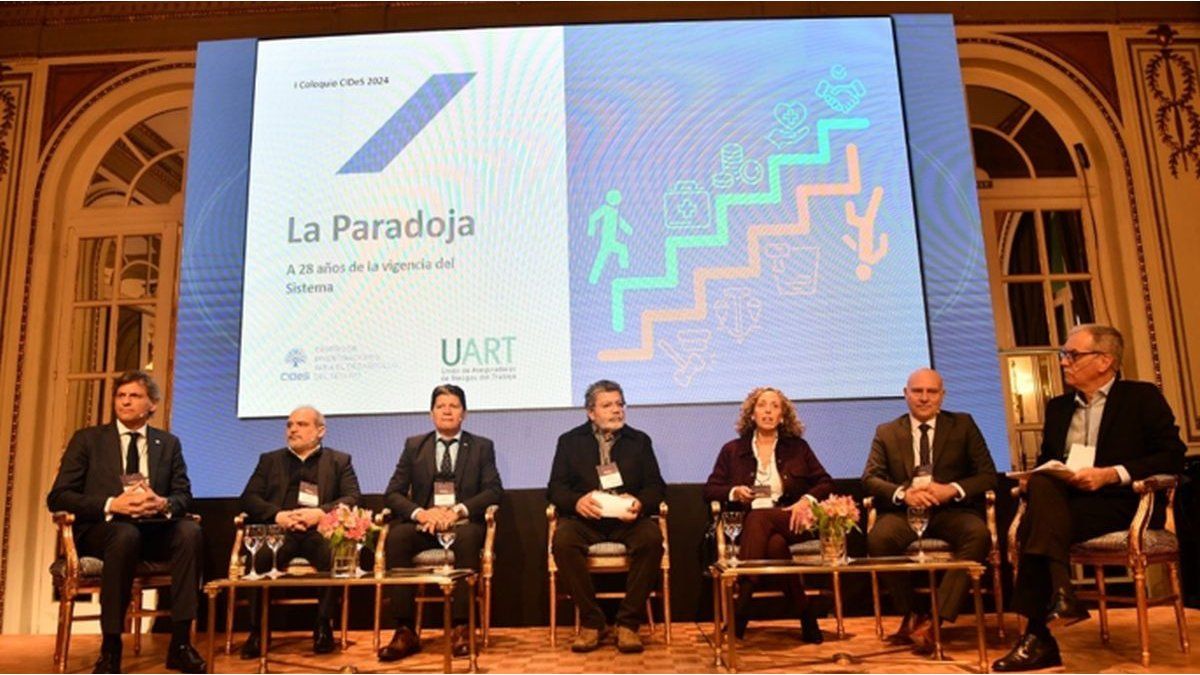It was carried out on First Annual Colloquium of CIDeS (Center for Research on Insurance Development)under the motto “The Impact of Litigation on the Argentine Economy”. Jurisprudence and Insurance. Legislative and Regulatory Proposals in Argentina, and their impact through insurance on the competitive environment and economic growth of the Nation.
Alexander Simon, President of CIDeSin addition to reaffirming the commitment to contribute to sustainable development through an increasingly established insurance industry, he maintained that the insurance sector suffers from the “scourge of the judiciary”. He also described recurring and distorting aspects such as the lack of uniformity in the jurisprudential criteria for determining damages, the mechanisms for updating judicial liabilities that affect solvency and financial stability, the incentives that encourage the willingness to initiate legal actions that are often unjustifiable, the expert fee schemes that generate conflicts of interest and distort the reality of the damages suffered, mandatory mediation mechanisms that have proven to be ineffective, among others.
With a specific panel on the impact of litigation on Occupational Hazards, the UART, Union of Occupational Risk Insurers, He outlined the pressing situation that the growing number of lawsuits generates and made clear the path to resolve the problem: constitution of the Forensic Medical Corps (CMF)This view was shared by the other panellists, who addressed different aspects of the issue, as well as by the majority of the prestigious speakers present throughout the day.
Mara BettiolPresident of UARTopened his panel explaining The Paradox that occurs. Despite significantly reducing accidents due to prevention and control policies, improving coverage in services and extension, increasing and keeping monetary compensations up to date, having made numerous modifications to the system, having more than 20 rulings by the Supreme Court of Justice of the Nation that validate its operation, “there are no reasons linked to the performance of the System that justify the current volume of new lawsuits, close to the pre-reform amount of 2017,” specifically sanctioned to reduce lawsuits. In fact, 117 thousand new lawsuits were filed in 2023. This contrasts with the systematic decline in deaths and accidents in the workplace. Accumulating a fall of 80% in deaths, which meant saving 17,700 lives, and a fall in accidents of 50%, which prevented 3.9 million accidents.
Bettiol explained that the problem of the number of trials is compounded by the increase in the value of trials due to the application of unattainable and unpredictable refresh ratessince different courts in the country use different criteria to calculate them.
The solutionfor the UART and for most of the actors in the System it is to close the gap between administrative and judicial procedures in order to determine damages resulting from an accident at work. How to do it? The mechanism is provided for in Law 27,348They are the Forensic Medical CorpsIts implementation depends on the decision of each Superior Court of the participating provinces and in CABA of the CSJN, at least until the labor jurisdiction is transferred to CABA. To date Mendoza was the only province that implemented it last year.The expert procedure of Law 27,348 provides that 1) professionals are chosen by a competition based on their background and not by simply listing them on a list, 2) that they charge fees based on salary or medical act and not as a percentage of the sentence based on the damage they themselves determine, 3) that they are referenced in the Scale (disability measurement table) that is also part of the Law, as do the Medical Commissions and 4) applicable to all cases.
In respect of the updatesMara Bettiol commented that, following the latest ruling by the SCJN, the Lacuadra case, the regulation of a specific rate by the BCRA would contribute to greater rationality in the updates, both in general labor matters and in occupational risks.
There was agreement among all panel members regarding the need to limit litigation. Guillermo Plate, Insurance Superintendentstated that 60% of the stock of lawsuits in the insurance sector corresponds to Work Risks, a system that works because it is useful for the worker and the company.” Dalmiro Garay, head of the Mendoza Courtpresented the reform scheme in the province of Cuyo, which is currently the only one that has established medical bodies. In seven years of reforms, they went from 28,000 annual trials to about 15,000. “It is 49% of the starting point. The experts charge half a JUS, which today is $200,000 per expert opinion” a value decoupled from the percentage of damage they determine, said the magistrate. Fernando Perez, General Manager of the Superintendence of Occupational Risks (SRT)indicated that this organization will try to continue promoting the adherence to the Law of the provinces that have not yet done so and emphasized that they will work to form the body of experts in the provincial courts, as well as to simplify the scale and give course to the prevention bill that was worked on in the past together with the social actors. Gerardo Martinez, Secretary General of UOCRA He argued that the coverage of occupational risks is a subsystem of social security and was in favor of promoting a law on the prevention of occupational risks worked on with the SRT. Finally, the President of the Argentine Confederation of Medium-sized Enterprises (CAME), Alfredo GonzalezHe also agreed on the need for forensic experts to have fixed fees, and mentioned a series of measures that should be implemented in the judicial sphere to make companies more competitive without this implying cutting back on rights.
They were present at the event analyzing the problem of high litigation concentrated in the sector Dr. Ricardo Lorenzetti, member of the Supreme Court of Justice, the Minister of Justice Mariano Cúneo Libarona, the Superintendents of Insurance and Labor Risks, Guillermo Plate and Gustavo Morón, The President of the Chamber of Deputies, Martín Menem, five deputies from different parties, the Secretary of Finance of the Nation Pablo Quirnoamong others.
Source: Ambito




